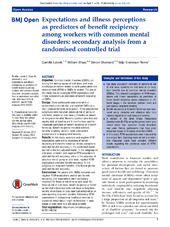Expectations and illness perceptions as predictors of benefit recipiency among workers with common mental disorders: secondary analysis from a randomised controlled trial
Peer reviewed, Journal article
Published version
Permanent lenke
https://hdl.handle.net/1956/9734Utgivelsesdato
2014-03-03Metadata
Vis full innførselSamlinger
Originalversjon
https://doi.org/10.1136/ bmjopen-2013-004321Sammendrag
Objective Common mental disorders (CMDs) are among the leading causes of sick leave, and more knowledge on factors related to work participation and return-to-work (RTW) in CMDs is needed. The aim of this study was to investigate RTW-expectations and illness perceptions as predictors of benefit recipiency in CMDs. Design Study participants were enrolled in a randomised controlled trial and reported CMDs as a main obstacle for work participation. Three prespecified subgroups were included: people at risk of going on sick leave, people on sick leave (>3 weeks) or people on long-term benefits. Baseline questionnaire data and registry data at baseline and 6 months were used to investigate predictors of benefit recipiency at 6-month follow-up. Benefit recipiency included sickness benefits, disability pension, work assessment allowance and unemployment benefits. Results In this study, uncertain and negative RTW-expectations were strong predictors of benefit recipiency at 6 months follow-up. Illness perceptions predicted benefit recipiency in the unadjusted model, but not in the fully adjusted model. In the subgroup on sick leave, uncertain and negative RTW-expectations predicted benefit recipiency, while in the subgroup of people at risk of going on sick leave, negative RTW-expectations predicted benefit recipiency. In the subgroup on long-term benefits, only female gender predicted benefit recipiency. Conclusions For people with CMDs, uncertain and negative RTW-expectations predict later benefit recipiency, and expectations seem particularly important for those at risk of or on sick leave. For those at risk of sick leave, benefit recipiency at follow-up denoted a transition onto sick leave or long-term benefit, while those on sick leave had remained so or were receiving long-term benefits. Addressing RTW-expectations in occupational healthcare services or vocational rehabilitation might be beneficial in early stages or even prior to a sick leave episode.

